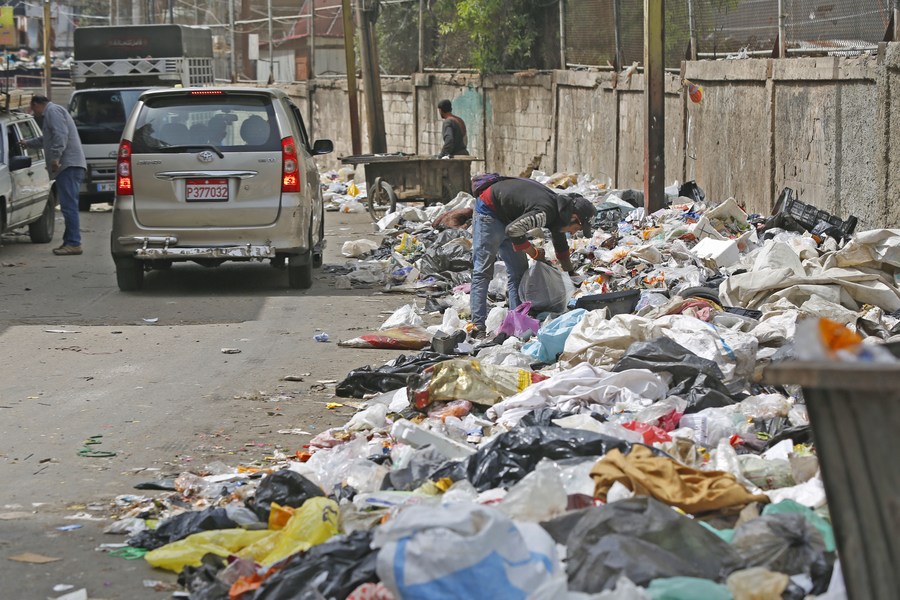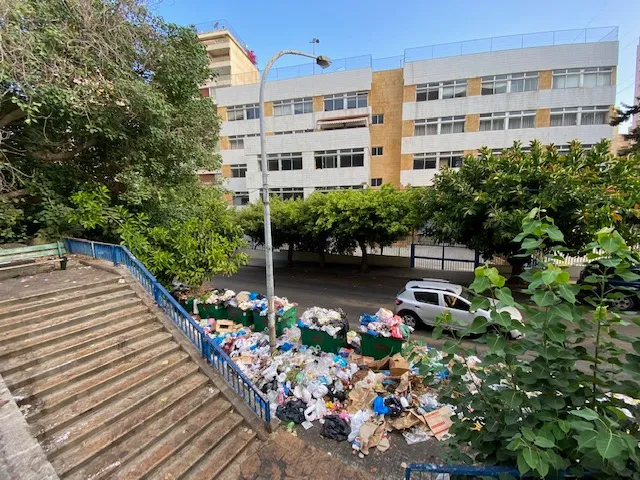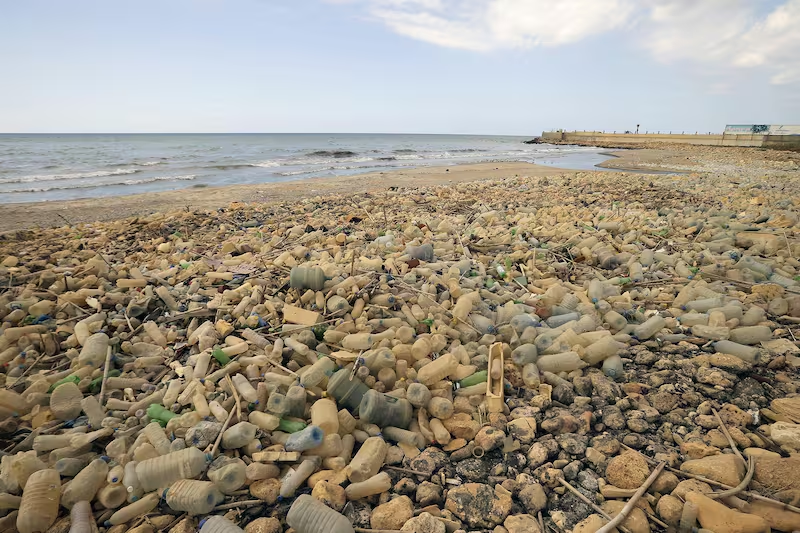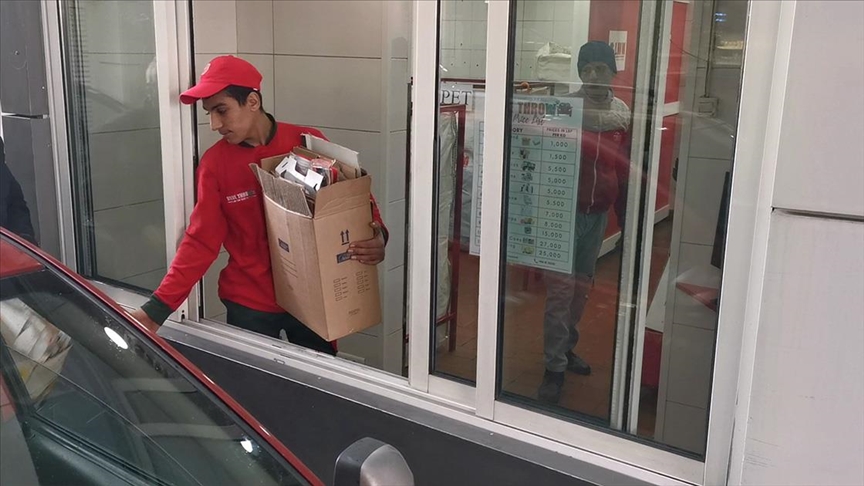
Problems
Causes of the waste management сrisis in Beirut, Lebanon
Lebanon underwent a crisis in 2015 due to its difficulties in dealing with its municipal solid waste, which culminated in uncollected waste piling up in the streets and illegal open dumping and burning. The closure of one of the country’s largest landfills in Naameh and the abrupt halt in waste collection led to rubbish piling up in the streets of Beirut and Mount-Lebanon. This situation triggered months-long protests and heated debates around the need to re-organise the sector. Causes of the waste management сrisis in Beirut, Lebanon: ● Because of the war, Beirut was divided into two parts, and traffic, including trucks with waste, became difficult. ● Landfills were closed, but there was no alternative waste disposal plan. ● Corruption The government has no interest in a long-term solution because corrupt politicians profit financially from juicy contracts signed with friendly private contractors, said Samar Khalil, environmental management specialist. The traditionally centralised waste management system in the country has very little sorting capabilities, meaning that the money isn’t in recycling, it’s in generating lots of waste. ● The issue with incinerators is that it doesn’t suit Lebanon type of waste Around 70% of waste is organic. It’s too wet to be processed in incineration. Incineration also requires strict sorting at source. ● There are no laboratories that are equipped to ensure quality and make sure that the fumes coming from incinerators are safe. There is no way to take action to ensure that quality control is upheld and up to the standards that Europeans follow.
The health impact of the waste management crisis in Beirut, Lebanon
Team from the University Center for Nature Conservation in Lebanon has shown that those who live near garbage heaps or open burning sites (or both) are more likely to suffer from respiratory diseases. This is due to the higher levels of bacteria and fungi in the air we breathe due to piles of rubbish on the streets. Installing incinerators will increase air pollution.
Solutions
Sustainable Waste Management Solutions
Author: Berytech
Many municipalities have been implementing a sustainable solution for waste management through recycling, and other methods have shown significant success, like Bechmizzine – Koura, Brih, Chouf, and many more. There are currently three laws for waste management, sorting, and protecting the environment that can be sufficient to start working on eco-friendly procedures. Sorting is primarily common in Beirut, but it is expanding gradually into other large cities and villages.
Source: https://berytech.org/waste-management-innovative-solutions-for-better-communities-and-economies/
Gallery
5Timelines
2023
February
For the first time in Lebanon, anyone can sell their waste from their car window to another window, as part of a project launched by 31-year-old Pierre Baaklini, which could contribute to addressing the country's chronic waste crisis. The difference between the project is that through the “drive-thru” or “drive-by” service, a person sells recyclable materials and charges for it directly through the window through which he delivers these materials. So, instead of throwing waste out the car window onto the roads, there is now an incentive to throw it in the right place in preparation for recycling, which will bring economic and environmental benefits later on.
January
The latest of the initiatives to protect the environment and encourage sorting and recycling is the "Donate and Recycle for a Vision" campaign, which was able to combine both human and environmental aspects and was launched by the Vision Care Association in cooperation with the "Beirut Association social development” and “Imkan” association with the support of the Ministry of Environment. The project calls for the reuse and recycling of medical glasses instead of throwing them away or leaving them in drawers with no use, as many do. Ameera Abu Adila, founder of the Vision Care Association, indicated that glasses are supposed to be divided into three groups: the first includes glasses that are still in good condition and usable, so that lenses can be added to them and given to those who they are in need, as for the second group, they include glasses that need repair and restoration, which are being worked on and distributed, the third group includes glasses that are unusable, which must be damaged and disposed of. He explained that the latter group goes to the company to sort the materials between plastic and metal and undertakes to smash the damaged glasses, taking care of trademark protection as required by law, and after converting the glasses into raw materials ready for recycling. The ministry is currently working with international organizations such as UNDP and this has secured a $9 million donation to recycle several materials, especially e-waste as well as batteries. Among other initiatives, Adviser to the Minister of Environment Muhammad Al Abyad mentioned initiatives taken by green waste municipalities, including the Gobeiri municipality in Beirut and the Zahle (Bekaa) municipality, as well as companies involved in the production of compost through recycling. He noted that the vegetable market in Beirut is one of the problems that the ministry is seeking to solve by using its waste to produce compost, and each plan can have an important impact in the future and contribute in one way or another.
2022
Signed an agreement on May 18 with the World Bank for the rehabilitation of the recycling and composting factories destroyed by the Beirut blasts. The project is scheduled to be finished in the summer of 2023.
2020
Julien Jreissati, a campaigner at Greenpeace Mediterranean, said the trash crisis was further exacerbated as two sorting and composting facilities for municipal waste located in Karantina were severely damaged by the explosions that rocked Beirut on Aug. 4.
2018
Lebanon passed a waste management law that would pave the way to reduce market concentration and recover as much waste as possible through recycling and composting, boosting not just the local economy but the country’s environmental wellbeing. It would also create a waste management regulation authority, whose members would be based on the recommendations of the environment minister.
2015
After years of protests by residents, city of Naameh dump was also closed. But there was no alternative waste disposal plan, so refuse sat, uncollected, for weeks in the sweltering heat in the streets of the capital, creating the rubbish crisis. In the summer, some 20,000 tonnes of rubbish flooded the streets of Beirut, sparking protests.
1994
West Beirut’s waste piled up in the city centre in what was known locally as the Normandy dump. It had reached 5 million cubic metres. Half of its volume was under sea level, reaching depths of 20m.
1987
Environmental NGO Greenpeace reported that a Christian militia, the Lebanese Forces, dumped 2,000 barrels of smuggled toxic waste from Italy in Bourj Hammoud. The party denies such accusations.
1978
The capital’s municipality decided to dump most of the capital’s garbage in the sea. East Beirut’s rubbish went to Bourj Hammoud, a poor suburb that housed mainly Armenian refugees who had fled genocide.



